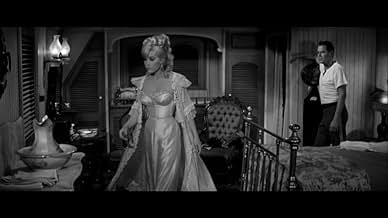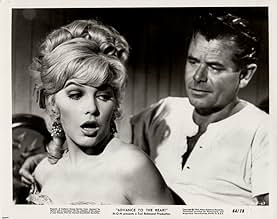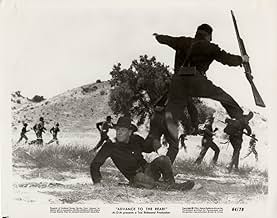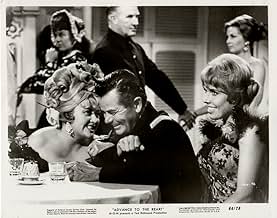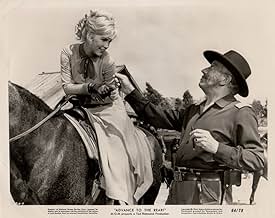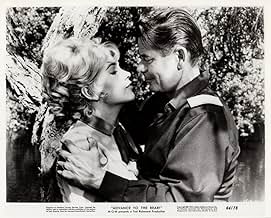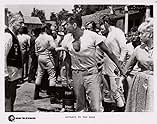NOTE IMDb
5,9/10
945
MA NOTE
Ajouter une intrigue dans votre langueWhen A Union Army outfit of misfits and rejects is sent to the Western territory, Southern spies try to figure out what they're doing there.When A Union Army outfit of misfits and rejects is sent to the Western territory, Southern spies try to figure out what they're doing there.When A Union Army outfit of misfits and rejects is sent to the Western territory, Southern spies try to figure out what they're doing there.
- Réalisation
- Scénario
- Casting principal
Alan Hale Jr.
- Sergeant Davis
- (as Alan Hale)
Richard Adams
- Courier
- (non crédité)
Leon Alton
- Waiter
- (non crédité)
Robert Anderson
- Steamboat Captain
- (non crédité)
Ann Blake
- Member of the Law & Order League
- (non crédité)
Danny Borzage
- Trooper
- (non crédité)
Avis à la une
I saw this movie in the basement movie studio of Ytterboe Hall (my freshman college dorm -- alas now only a memory) when it came out 37 years ago. After I got married and settled down, I started scanning the television listings regularly for it. After 20 years, one of the channels started showing it in the wee hours so I managed to tape it. 'Advance To The Rear' is a rare gem.
This movie was made during the short but glorious window of cultural innocence (between R & B and the Rolling Stones) when folk music was as popular as rock. The music is by Randy Sparks and sung by his New Christy Minstrals. The song 'Today' is from this movie.
Stella Stevens, as the Confederate spy, is gorgeous beyond description. Glen Ford plays the bemused hero trying to do things by the book admidst a collection of misfits ('We're a company of cowards and we've come to save the day.'). Jim Backus ('Gilligan's Island' and the voice of Mr. Magoo) leads a familiar cast of veteran supporting actors and actresses of the era. Did I mention that Stella Stevens is good looking?
'Advance To The Rear' is a B-movie masterpiece. One of those rare examples of everything coming together perfectly. For those of us who remember the era, it is also very evocative -- perhaps more so than any other movie of its time. It would be nice if whoever has the rights would release it, my VHS tape is getting a little flaky. By the way, they made an LP of the sound track. Now that be a major garage sale find.
This movie was made during the short but glorious window of cultural innocence (between R & B and the Rolling Stones) when folk music was as popular as rock. The music is by Randy Sparks and sung by his New Christy Minstrals. The song 'Today' is from this movie.
Stella Stevens, as the Confederate spy, is gorgeous beyond description. Glen Ford plays the bemused hero trying to do things by the book admidst a collection of misfits ('We're a company of cowards and we've come to save the day.'). Jim Backus ('Gilligan's Island' and the voice of Mr. Magoo) leads a familiar cast of veteran supporting actors and actresses of the era. Did I mention that Stella Stevens is good looking?
'Advance To The Rear' is a B-movie masterpiece. One of those rare examples of everything coming together perfectly. For those of us who remember the era, it is also very evocative -- perhaps more so than any other movie of its time. It would be nice if whoever has the rights would release it, my VHS tape is getting a little flaky. By the way, they made an LP of the sound track. Now that be a major garage sale find.
It is impossible to see this film and not find it intelligently hilarious. You will laugh your way through it and never once feel your time has been wasted. The premise is simple and, in an odd way, that may in fact be it's strength.
During the last days of the Civil War, a contingent of Union soldiers, have made an uneasy accommodation with their Confederate counterparts stationed a few miles away. Every day at a certain time, each side fires a round of cannon fire at the other, timed to a deliberate miss. The aim of both sides is to, hopefully, last out the war in this manner: reasonably safe and secure.
This arrangement works quite well, until a brash headstrong Union Captain (played well by Glenn Ford)decides,on his own, to go out and capture a few of the "enemy". This of course forces their equally reluctant "enemy" to retaliate.
Ford's Commander,(played with exquisite timing by veteran actor Melvyn Douglas) is horrified. "What have you done?" he shouts at him, "take them back! How many times have I instructed you not to show initiative?" From this point on, the humor escalates and never ceases.
Staffed by some of the most recognized character actors of the time, we are treated to a highly skilled portrayal of an incredibly believable assortment of military misfits. What makes them believable is that their characterizations are delivered with depth. And this, in a sense, makes them somewhat realistic and all the more funnier.
This high caliber B-film is well scripted and, to it's credit, is finally being recognized for the cinematic gem that it is. My advice to all film lovers is to seek out this almost forgotten treasure. Trust me, you won't be disappointed.
During the last days of the Civil War, a contingent of Union soldiers, have made an uneasy accommodation with their Confederate counterparts stationed a few miles away. Every day at a certain time, each side fires a round of cannon fire at the other, timed to a deliberate miss. The aim of both sides is to, hopefully, last out the war in this manner: reasonably safe and secure.
This arrangement works quite well, until a brash headstrong Union Captain (played well by Glenn Ford)decides,on his own, to go out and capture a few of the "enemy". This of course forces their equally reluctant "enemy" to retaliate.
Ford's Commander,(played with exquisite timing by veteran actor Melvyn Douglas) is horrified. "What have you done?" he shouts at him, "take them back! How many times have I instructed you not to show initiative?" From this point on, the humor escalates and never ceases.
Staffed by some of the most recognized character actors of the time, we are treated to a highly skilled portrayal of an incredibly believable assortment of military misfits. What makes them believable is that their characterizations are delivered with depth. And this, in a sense, makes them somewhat realistic and all the more funnier.
This high caliber B-film is well scripted and, to it's credit, is finally being recognized for the cinematic gem that it is. My advice to all film lovers is to seek out this almost forgotten treasure. Trust me, you won't be disappointed.
I have just finished reading Jack Schaefer's book, "Company of Cowards", and by coincidence, I watched this film on TCM this morning. I have to say that, apart from the names of some of the characters, this film bears very little resemblance to the book. For example, in the film, the character of Hugo Zattig, is a villainous and duplicitous, Confederate officer, played by James Griffith. In the book, the character is one of the "Company of Cowards", whose honour is redeemed at the end of the book.
Technically, the book was a historical novel, centred around the fictional character of Jared Heath, himself a disgraced Union officer, busted to sergeant, who was detailed to take charge of a company of other disgraced officers who had also been demoted for crimes such as desertion, disobedience, brawling and other such offences that are not tolerated in any Army, past or present. The end of the novel describes how Jared Heath and his "Company of Cowards" manage to redeem themselves during a heroic battle against Comanche and the Kiowa Indians, with a few of them giving their own lives in the heat of battle.
I should imagine that the producers and MGM had a lot of debate about how this film should be made. Was it to be a film about the true horrors of war and how disgraced soldiers were treated by the other troopers, as depicted in the novel? No, it was to be made as a knockabout comedy, directed by George Marshall, who had already directed James Stewart in "Destry Rides Again" and Glen Ford in a few other films, such as another comedy western, "The Sheepman".
A question had already asked as to whether the television comedy series, "F Troop" was loosely based on this film. Well, as the series was released on ABC a year later, it is probably more than a coincidence that the producers of the series did take some inspiration from this film. Ken Berry would have been a more naïve version of the Glen Ford character.
Jack Schaefer's novel was a very serious study on how the American Civil War was fought, which went on to describe the horror of fighting in the Indians Wars, when many hostile Indian tribes took advantage of the fact that the "white men" were distracted with fighting each other.
There were also some political comments about why the Union government kept changing its mind as to the reason for the war, starting out with political wrangles about why the Federal Government should have control over the distant Southern States; with the economic disparity between the Southern States and the Northern States; the need to keep the Union together; and, finally, the Abolition of Slavery.
Jack Schaefer wrote "Shane", one of the greatest and most realistic westerns ever written and filmed - I wonder what he thought of how his original novel was brought to the screen.
I will give the film 8 out of 10 for the lively performances of Glen Ford and the lovely Stella Stevens.
Technically, the book was a historical novel, centred around the fictional character of Jared Heath, himself a disgraced Union officer, busted to sergeant, who was detailed to take charge of a company of other disgraced officers who had also been demoted for crimes such as desertion, disobedience, brawling and other such offences that are not tolerated in any Army, past or present. The end of the novel describes how Jared Heath and his "Company of Cowards" manage to redeem themselves during a heroic battle against Comanche and the Kiowa Indians, with a few of them giving their own lives in the heat of battle.
I should imagine that the producers and MGM had a lot of debate about how this film should be made. Was it to be a film about the true horrors of war and how disgraced soldiers were treated by the other troopers, as depicted in the novel? No, it was to be made as a knockabout comedy, directed by George Marshall, who had already directed James Stewart in "Destry Rides Again" and Glen Ford in a few other films, such as another comedy western, "The Sheepman".
A question had already asked as to whether the television comedy series, "F Troop" was loosely based on this film. Well, as the series was released on ABC a year later, it is probably more than a coincidence that the producers of the series did take some inspiration from this film. Ken Berry would have been a more naïve version of the Glen Ford character.
Jack Schaefer's novel was a very serious study on how the American Civil War was fought, which went on to describe the horror of fighting in the Indians Wars, when many hostile Indian tribes took advantage of the fact that the "white men" were distracted with fighting each other.
There were also some political comments about why the Union government kept changing its mind as to the reason for the war, starting out with political wrangles about why the Federal Government should have control over the distant Southern States; with the economic disparity between the Southern States and the Northern States; the need to keep the Union together; and, finally, the Abolition of Slavery.
Jack Schaefer wrote "Shane", one of the greatest and most realistic westerns ever written and filmed - I wonder what he thought of how his original novel was brought to the screen.
I will give the film 8 out of 10 for the lively performances of Glen Ford and the lovely Stella Stevens.
As others are who have studied the long and estimable body of his work, I am a great admirer of George Marshall. The versatile director had an ability to tell a story with a camera that was legendary; in "Advance to the Rear" he found, I suggest, one of his richest hoards of cinematic possibilities. The story-line of this rare historical comedy takes the viewer back to the final days of the Civil War is winding to an inevitable close; so the commander of one contingent of union soldiers has made a separate truce with his Confederate counterpart. At a prearranged time, a single cannon round, fired to miss, is set off by each side. And that is their daily war. Period. This life-preserving but odd arrangement works quite well, until a youthful officer, recently posted to the "Company of Cowards", the name in the original novel from which the narrative was extracted, sallies forth and captures some of "the Rebs". This precipitate action of course obliges their equally reluctant "enemies" to do something else, that starts to look like an act of war. "What have you done?" the union Colonel bellows at him, "Take them back! How many times have I instructed you not to show initiative?" The company depicted obviously bears a striking resemblance to "F Troop"; this film was undoubtedly the model for that enjoyable TV series.. After a major mess ensues, the group are dispatched to the West where it is hoped they cannot do too much damage to the Union cause. And then the viewer learns these misfits will have to protect a large gold shipment that Confederate guerrillas will really be trying to make away with.. The young officer has another thorn in his side; the complication is that he has fallen head-over-heels for a gung-ho and gorgeous female Confederate spy. What happens next has to be seen to be howled at. The actors in this colorful comedy-and adventure and romance are under-appreciated Glenn Ford, the ultra-skilled award-level Melvyn Douglas as the Union colonel in question, Stella Stevens as the well-constructed spy, and a large number of very good supporting actors including Jim Backus, Joan Blondell, Whit Bissell, Andrew Prine, Jesse Pearson, Michael Pate, Alan Hale, Jr., James Griffith, and many more in smaller roles. The writers credited with this hilarious screenplay, probably also an inspiration for "Hogan's Heroes" included veteran screenwriter William Bowers, Robert Carson, Samuel A. Peeples and Jack Schaefer. The music was provided by Randy Sparks, the vivid cinematography by the talented Milton Krasner. The very fine art direction was done by George W. Davis and George Imazu, with set decoration by Budd Friend and tasteful Henry Grace, with costumes by Walter Plunkett, makeup by the legendary William Tuttle and hairstyles by Sydney Guilaroff. This is a film which has everything I suggest that a comedy could ask for--a strong central character, a clear set of goals, well- developed characters, humor born out of situation, character and reaction, and a first-rate production in the hands of a director who gives every moment its due but never slows down the pace. Please watch this feature the next time it is presented; I believe you will appreciate its classic comedy mood as much as I do. I suggest it is a one-of-kind comedy although very often imitated.
This film was shown on Turner Classic Movies and in the absence of other reviews, this review is for the film itself, only. It's also known as "Advance In Reverse".
It's not hard to fall into liking this easy-going and ramshackle comedy, which switches easily from knockabout physical humour (with 'assorted' sound effects) to silly dialogue and a general feel that the assorted misfits of this Union regiment just aren't taking their roles that seriously. The story, for what it is has the regiment being sent out of reach of action but still manage to capture a rebel spy, played by Stella Stevens and they all end up in a heap of trouble. A $2 million gold bullion gets in the mix as do some rather "friendly" Indians.
Glenn Ford is easily the most recognisable as the captain and Melvyn Douglas as the Colonel "in charge" and these two string it all together and he's not bad at comic timing or deadpan delivery. He has a romantic fling with Stevens, as all the regiment do (in their dreams!) Destry Rides Again director George Stevens' film is in widescreen and (here) an attractively dark-greened tinged black & white and which runs for 96mins.
The comedy is gentle and clever rather than broad, or crude and the targets are fairly obvious but as it's all fairly sweet it's all a nicely pleasurable watch rather than anything classic or downright hilarious - though the scene where they storm the camp, dressed in long-johns, with boards on their feet down the dry grass slopes, to the soundtrack of a WW2 fighter plane battle is actually really rather humorous!
It's not hard to fall into liking this easy-going and ramshackle comedy, which switches easily from knockabout physical humour (with 'assorted' sound effects) to silly dialogue and a general feel that the assorted misfits of this Union regiment just aren't taking their roles that seriously. The story, for what it is has the regiment being sent out of reach of action but still manage to capture a rebel spy, played by Stella Stevens and they all end up in a heap of trouble. A $2 million gold bullion gets in the mix as do some rather "friendly" Indians.
Glenn Ford is easily the most recognisable as the captain and Melvyn Douglas as the Colonel "in charge" and these two string it all together and he's not bad at comic timing or deadpan delivery. He has a romantic fling with Stevens, as all the regiment do (in their dreams!) Destry Rides Again director George Stevens' film is in widescreen and (here) an attractively dark-greened tinged black & white and which runs for 96mins.
The comedy is gentle and clever rather than broad, or crude and the targets are fairly obvious but as it's all fairly sweet it's all a nicely pleasurable watch rather than anything classic or downright hilarious - though the scene where they storm the camp, dressed in long-johns, with boards on their feet down the dry grass slopes, to the soundtrack of a WW2 fighter plane battle is actually really rather humorous!
Le saviez-vous
- AnecdotesThe steamboat used in this movie was originally built and used as the Cotton Blossom, in MGM's Show Boat (1951). It was also used in L'arbre de vie (1957) and Les aventuriers du fleuve (1960). In the 1970s, it was one of the props auctioned off by the studio.
- GaffesIn the scenes where the cannons fire 30 rounds, some of the cannons fire before their fuses are ignited.
- Citations
Martha Lou: All right. Let's say, just for the moment, that I *am* a spy.
Heath: A very pretty one, too.
Martha Lou: That would make us enemies, Jared.
Heath: Yeah, of course it would. And, we'd be starting out at a point in marriage that takes some couples twenty or thirty years to achieve!
Meilleurs choix
Connectez-vous pour évaluer et suivre la liste de favoris afin de recevoir des recommandations personnalisées
- How long is Advance to the Rear?Alimenté par Alexa
Détails
- Durée
- 1h 40min(100 min)
- Couleur
- Rapport de forme
- 2.35 : 1
Contribuer à cette page
Suggérer une modification ou ajouter du contenu manquant


